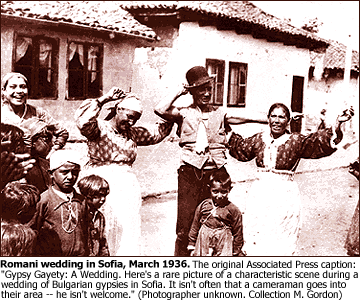 English-speaking people used to
call them Gypsies. They now call themselves the Roma or Rroma: modern
descendants of a nomadic people who left India perhaps a thousand years ago and
made their way gradually to Europe, where they have been persecuted to this day.
Their language, heard in many dialects, is called Romani or Romanes. As is often
the case with people living on the margins of society, they've had a
disproportionate impact on the musical traditions and folklore of Eastern Europe
and the Balkans. English-speaking people used to
call them Gypsies. They now call themselves the Roma or Rroma: modern
descendants of a nomadic people who left India perhaps a thousand years ago and
made their way gradually to Europe, where they have been persecuted to this day.
Their language, heard in many dialects, is called Romani or Romanes. As is often
the case with people living on the margins of society, they've had a
disproportionate impact on the musical traditions and folklore of Eastern Europe
and the Balkans.
Performers
- Esma Redzepova is the leading Balkan
Rom singer of her generation
- Ivo
Papazov (or Papasov) is an incredible Turkish Rom clarinetist from Bulgaria
who helped bring Bulgarian Rom wedding music to worldwide prominence.
- An interview with
Yuri Yunakov,
who played sax with Ivo Papazov's band and who now leads the Yuri Yunakov
Ensemble in New York.
-
Ferus Mustafov, one of many talented musicians in the Jasharov family, is
one of the best-known Rom sax and clarinet plays in the Balkans.
-
The Kochani Orchestra, a Romani brass band from Macedonia.
- Kalyi Jag
("Black Fire") was one of the first modern Rom bands in Hungary to perform Rom
roots music in a traditional style, sans strolling violinists.
- RootsWorld lists a number of
Rom bands available on
CD.
- A brief list of Rom (or Romani-style)
songs and bands from the former Yugoslavia, with some lyrics in a mixture of
Serbo-Croatian and Romanes.
- Carol Silverman,
one of the leading American researchers of Rom culture, sings with Yuri Yunakov.
- The Django Reinhardt Swing Page is
an excellent site about the legendary jazz guitarist and other Rom jazz
guitarists.
- The ubiquitous Gipsy Kings rose to
fame from a community of Roma in southern France.
Music and folklore links
- Michal Shapiro offers a good
introduction to Rom
music.
- Roma in Culture
and the Arts is a good overview, with many music links, from
The Patrin.
- Laura Shannon maintains a good
bibliography of resources on Rom music and wrote
this account
of a gathering of Romani musicians, including the Kochani Orchestra, in Lucerne,
Switzerland, in August 1995.
- Amala School in Serbia offers
workshops in Rom music, language and culture.
- The Hungarian
Gypsies, or Czigany, an 1843 account by George Borrow: "They are very fond
of music, and some of them are heard to touch the violin in a manner wild, but
of peculiar excellence."
- Romani
musicians on zurla and tapan at a St. George's Day celebration in
Blagoevgrad, Bulgaria: a photo by Stacia Spragg.
Shopping
Editorially selected links, not ads
General information
- The Patrin, perhaps the
best Romani site on the Web, maintained by M. Courbet as a tribute to his
grandfather, who escaped and then fought the Nazis in occupied France.
- A brief history of
the Roma, from The Patrin.
- Rroma.org supports Rom organizations and
performers.
- Les Roms de Roumanie, a
black-and-white photographic essay from 1996 by Yves Lreseche.
- The
Dream, a stunning photographic essay on life among the Roma of Blagoevgrad,
Bulgaria, by Stacia Spragg.
- Another report on the plight of
Roma in
Bulgaria, whose lot has not necessarily improved since the end of communism.
- Bury Me Standing: A
review of Isabel Fonseca's engaging book on the Roma of Eastern Europe.

Updated 4 January 2003 |
 English-speaking people used to
call them Gypsies. They now call themselves the Roma or Rroma: modern
descendants of a nomadic people who left India perhaps a thousand years ago and
made their way gradually to Europe, where they have been persecuted to this day.
Their language, heard in many dialects, is called Romani or Romanes. As is often
the case with people living on the margins of society, they've had a
disproportionate impact on the musical traditions and folklore of Eastern Europe
and the Balkans.
English-speaking people used to
call them Gypsies. They now call themselves the Roma or Rroma: modern
descendants of a nomadic people who left India perhaps a thousand years ago and
made their way gradually to Europe, where they have been persecuted to this day.
Their language, heard in many dialects, is called Romani or Romanes. As is often
the case with people living on the margins of society, they've had a
disproportionate impact on the musical traditions and folklore of Eastern Europe
and the Balkans.
